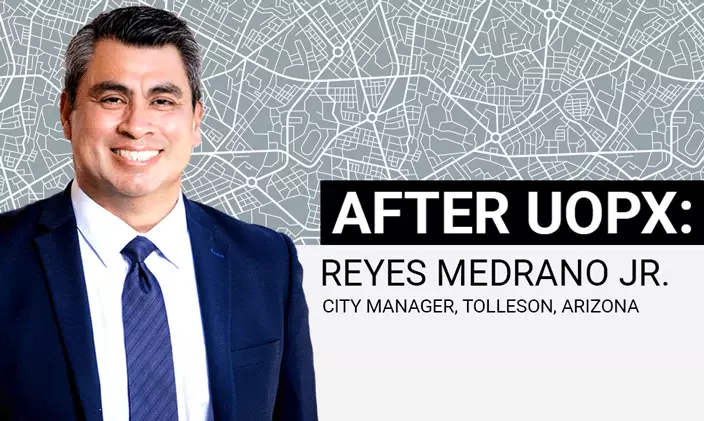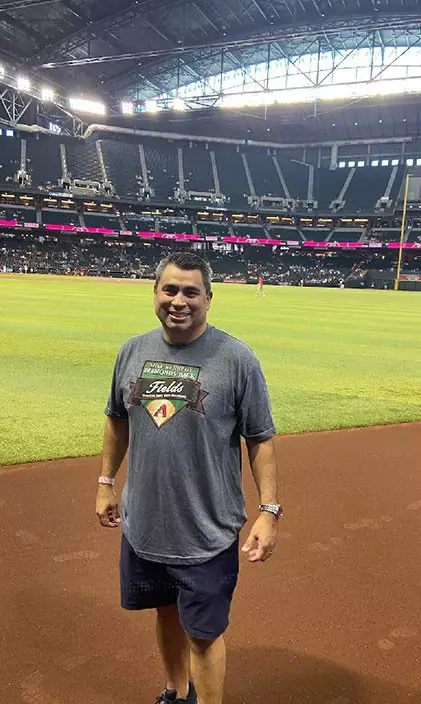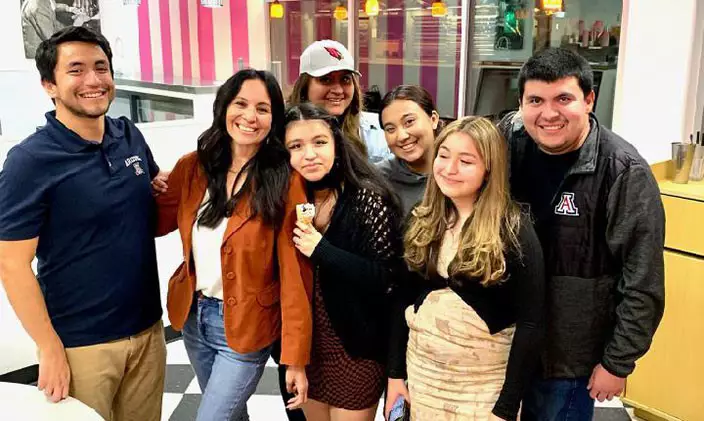The pursuit of happiness: Reyes Medrano Jr. answers the call to lead

Written by Elizabeth Exline

If there were any question about whether University of Phoenix alumnus Reyes Medrano Jr. was born to lead, it would be resolved with a translation of his first name. Spanish for “kings,” Reyes is the kind of name you give to a first-born child, a son born on Epiphany, or a person who eventually becomes one of the longest-serving city managers in Arizona.
Medrano, for the record, is all these things.
He’s also the first to point out he’s a “junior” and shares a name with his late father. Considering that Reyes Sr. also worked in city government and that both men embraced an approach to leadership that centers on discourse, listening and progress, that point just underscores the fact that Reyes Jr., as Tolleson’s city manager since 2005, is simply answering a calling that brings him both happiness and purpose.
“Our belief is that public service should evoke joy in the served and the servant,” Medrano says of himself and his colleagues. “We live that.”
An Arizona legacy
To hear Medrano tell it, he has only left Tolleson to be born (in a Phoenix hospital) and to attend a Catholic high school (also in Phoenix). Phoenix, mind you, is about a 20-minute drive from Tolleson.
While that record of absence is not strictly true, of course, the impression speaks to Medrano’s deep Tolleson roots. His grandmother was born in a migrant-worker camp, he says, and his grandfather moved to Tolleson from Texas.
By the time Medrano was born two generations later, his family had become more established, but the memory of what came before served as a motivation for the present. Medrano recalls watching the movie La Bamba as a child, and when the characters used makeshift showers in the middle of an orchard, Medrano’s family reacted.
“All of my aunts and uncles jumped up and said, ‘That’s how we grew up, so you guys never had to!’” Medrano says. “Their sole motivation was that future generations of Medranos had opportunity.”
For Medrano, that played out in a number of ways. He always assumed he’d go to college someday. He also saw the value people like his family could add to their community. And the fact that his father, who was vice mayor of Tolleson, used to declare, “One of these days, one of our kids is going to run this city!” — perhaps predisposed Medrano to consider a career as a public servant.
Opportunity meets personality

Of course, Medrano didn’t set out to be a city manager. He thought he would coach baseball or maybe go into engineering. In fact, he worked on the gear line at an aerospace company in his youth.
But when he was laid off, he resolved that would be the first and last time that would happen to him.
“I jumped into school with even more voracity,” he says. “I was determined never to put myself or my family through that. We were expecting our second child, and we’d just bought our first house.”
Medrano took a position as a police dispatcher for Tolleson, despite what he laughs off as his “horrible” Spanish, and he volunteered for the graveyard shifts so that he could go to school during the day. Eventually, he earned a bachelor’s degree in business at University of Phoenix and, later, a master’s degree at another university.
Medrano had also progressed through his career while pursuing his education. But the day before he was due to interview for a counseling position at a community college, Tolleson’s city manager approached him about a management assistant position.
“By that time, I had four kids, and I saw that [the city role] paid $5,000 more than [the college] was going to pay me,” Medrano says. “The words, ‘We want to train you to be city manager,’ kind of glossed over, and I thought, ‘I’ll do that.’”
The paycheck may have attracted him, but it was the work that ultimately retained him. Medrano worked his way up to assistant city manager and then, finally, city manager.
“On Oct. 12, 2005, I was sworn in as the first kid from Tolleson to be the city manager,” he says, recalling how, at the time, he was also the youngest person in Arizona to do so.
Like father, like son
Medrano’s father left his son with far more than a name. He also influenced his approach to overseeing a city with sometimes competing interests.
“My dad used to get death threats,” Medrano says. “One of the most profound things he ever said to me was, ‘Look, if we’re going to be better, if future generations are going to do better than us, then we need to learn to forgive and not repeat the same mistakes of those who oppressed communities like ours.’”
This outlook inspires Medrano in his daily work. A typical day as city manager may include doing media interviews, connecting with the community, mentoring Tolleson’s youth (he delights in his involvement with the Tolleson Teen Council) or recruiting business to the city.
Economic development is one of Medrano’s favorite projects. That’s the competitive part of his job, he says, and one he focuses on intensely. Whether it’s a production facility for PepsiCo or a Starbucks store, Medrano actively seeks opportunities to make Tolleson “recession-proof.”
Pilar Sinawi, the chief government affairs officer for Tolleson, can attest to Medrano’s economic focus. Sinawi has worked with Medrano for a decade and says economic viability is a top concern for Medrano — and, in her opinion, a valid one.
“We need to ensure that the city is fiscally sustainable to provide residents services and programs [that provide] a good quality of life. … Reyes will state, ‘My job is to make the money and for the council to set the vision of how we will spend it.’ It is because of Reyes’ leadership that the state of the City of Tolleson is fiscally sound.”
Medrano keeps this priority balanced with others. Sinawi points out that Medrano lives by the motto “Happiness breeds success, not the other way around.” He uses praise to effect positive outcomes, Sinawi says, and he encourages his colleagues to focus on happiness in general.

“As the leader within our organization, [Medrano] emphasizes the importance of communication, honesty and happiness,” Sinawi says.
His bridge building — both cultural and economic — ties back to Medrano’s heritage and future. What propels him out of bed each day and gets him to the office is his deeply held belief that he can remind and inspire his community to choose daily what this nation’s founders believed in: the pursuit of happiness.
“I believe the most important thing for me to do every day is to model the desired behavior to everyone who sees me, and that desired behavior is happiness,” he says. “I choose happiness. I want everyone to choose happiness and pursue it for the rest of our lives. You’re not always going to be happy. It just not possible. It’s the pursuit that matters and finding the elements of happiness in victory and tragedy.”

ABOUT THE AUTHOR
Elizabeth Exline has been telling stories ever since she won a writing contest in third grade. She's covered design and architecture, travel, lifestyle content and a host of other topics for national, regional, local and brand publications. Additionally, she's worked in content development for Marriott International and manuscript development for a variety of authors.
This article has been vetted by University of Phoenix's editorial advisory committee.
Read more about our editorial process.
Read more articles like this:


